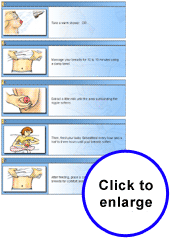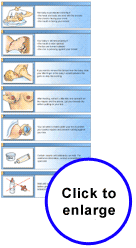h. Breast Care
There is no special care required for your breasts during pregnancy. Good daily hygiene is sufficient. The Montgomery tubercules (glands) situated under the areola are responsible to prepare your breasts for breastfeeding. To support your breasts, wear a bra that fits well; preferably without underwire.

1. General Breast Care
Basic care is important during breastfeeding
- Wash your breasts daily. Avoid putting soap on your nipples, especially if they are sore. Soap may dry your nipples and cause them to crack.
- Wear a well-adjusted bra that is not too tight. Do not wear a bra with underwires.
- After breastfeeding, express some breast milk into the nipples and the areolas in order to protect the skin. Allow the milk to dry before putting on your bra.
2. Hard Breasts
The breasts may become hard or engorged the first days after birth. This engorgement is caused by an accumulation of milk in the breasts. This happens during the inflow of milk usually three to four days after the birth of your baby. If your breasts become hard, the baby may have trouble feeding. The hardness should only last 1-2 days. Here is some advice to help soften your breasts.
During the first weeks, you may have to express breast milk if your breasts are too hard for the baby to latch on.
You will find more information on expressing breast milk in Module 8 entitled "Healthy Family".
 |
Ask for help immediately if you:
|
3. Sore Nipples
The nipples may become tender during the first few days birth. This situation should improve daily. Breastfeeding should not be painful. Check the following table if you have sore nipples.
 |
Ask for help immediately if your nipples are sore even though the baby is well-positioned and feeding properly. |

